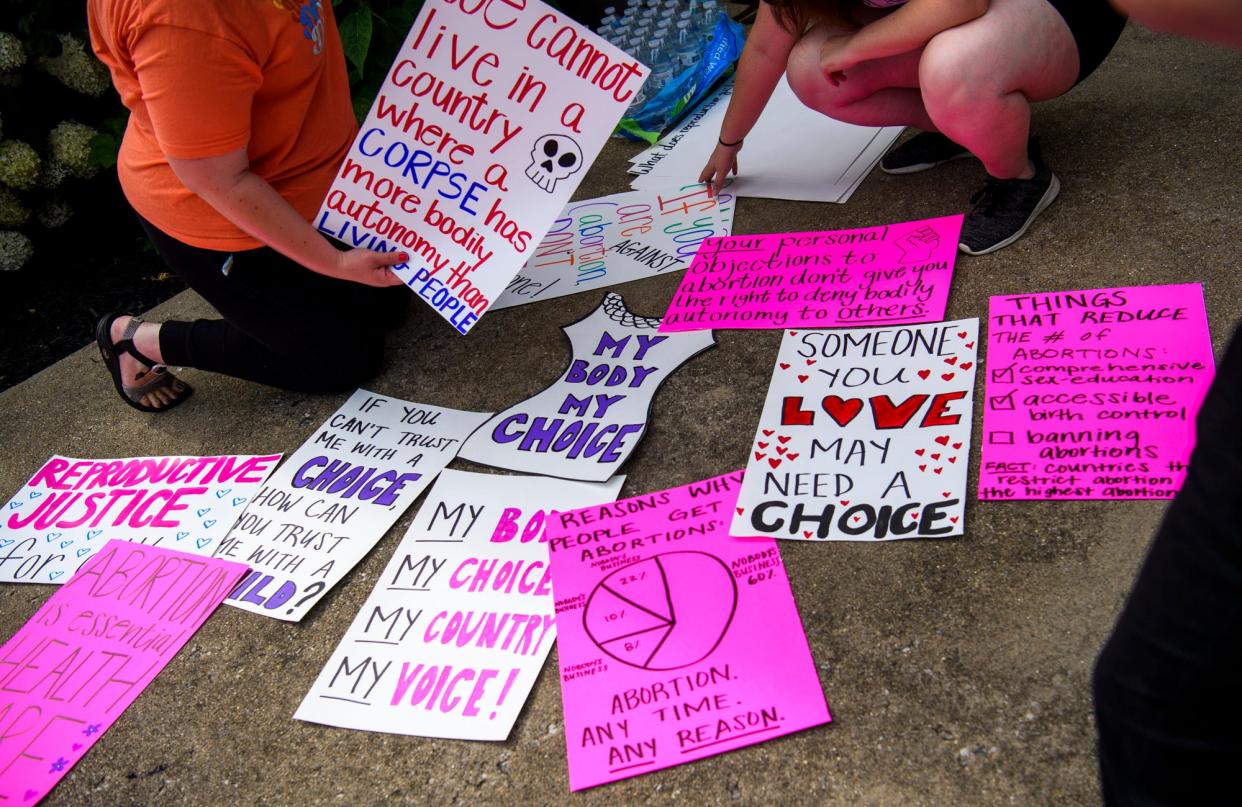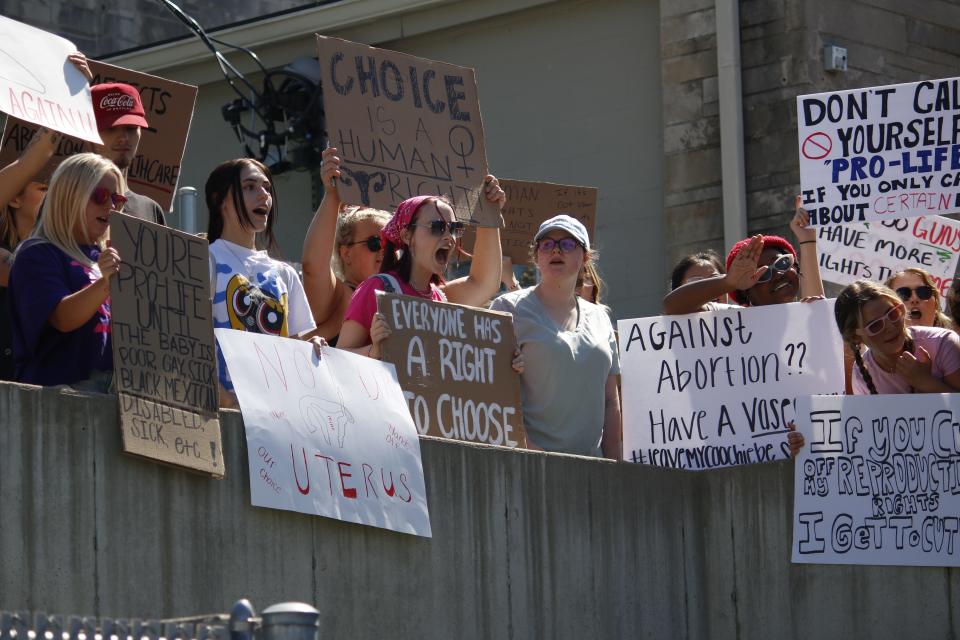What’s next? The implications of a post-Roe v. Wade world remain murky
- Oops!Something went wrong.Please try again later.

The overturn of Roe v. Wade has been a cause for concern for many Americans wondering what other precedents are now up for grabs. Three experts agree: No one knows what will happen next.
Indiana University professor of law Jody Madeira said while some Supreme Court justices, like Clarence Thomas, stated he wants to revisit rights such as same-sex marriage and access to contraceptives, Brett Kavanaugh said abortion was a special circumstance and other precedents are safe.
“The practical chances that the Supreme Court would overturn something else are low,” Madeira said.
How does the overturn of Roe v. Wade affect access to contraceptives?
Kristen Jozkowski, IU professor in sexual health, said as it stands now, the overturning of Roe v. Wade should not affect contraception, but it could in the future.
“Currently, I don't think that this decision should in the theory of law have or in the terms of law have an impact on contraception,” she said. “Practically, it may be that people make different contraceptive decisions now.”
Pictures of protest: Protest of the overturning of the Roe versus Wade decision by the Supreme Court
Americans’ concerns about these rights are valid, Madeira said, as increased restrictions on contraceptives, for example, are more likely.
Beth Cate, clinical associate professor at the O’Neill School of Public and Environmental Affairs at IU, said immediate changes are unlikely.
“If we don't want abortion, it would seem that ready access to effective contraception is a way to reduce the abortions,” Cate said.

Will same-sex marriage be next?
Obergefell v. Hodges was the Supreme Court decision in 2015 that made same-sex marriage legal and recognized that state bans on same-sex marriage are unconstitutional.
Same-sex marriage is protected not only by the 14th Amendment Due Process Clause, which came in to question in the abortion case, but also the Equal Protection Clause, Cate said. With the decision to overturn Roe v. Wade, the Court asserted that if a right is not explicit in the text of the Constitution, they must examine if it was historically upheld in American law.
While the Court might find a way to overturn the decision in Obergefell v. Hodges, Cate said it’s more likely they won’t, as overturning it would be a convulsion of society, meaning there is a reliance on that decision and people have ordered their lives around it.
“I don't think that the Supreme Court is showing any indication that it wants someone to bring in a case any time soon to overturn access to same sex marriage,” she said.
Have Americans lost their right to privacy?
There are two rights to privacy, Cate said, the right to informational privacy and the right to privacy as autonomy, which was previously the basis for the right to abortion access. Overturning Roe v. Wade raises questions about how government interference might affect other decisions related to privacy as autonomy.
More: Abortion rights supporters converge at courthouse to decry Roe v Wade ruling
Medical decisions that don’t involve another life, Madeira said, are probably safe. But for pregnant people, this decision raises questions about how far restrictions might go to protect that other life.
“If they’re subject to preterm labor, are we going to start to mandate that they stay home from work?” Madeira said. “Are we going to start to mandate that they avoid certain types of physical activity? How far are we going to go in order to protect fetal life?”
In Roe v. Wade, the Court decided that to the extent any right to privacy is implied in the Constitution, abortion is not a part of it. Cate said she thinks other privacy rights will be shaped on a case by case basis.
Could abortion access be federally reinstated?
For Roe v. Wade to become federal law, there are a few options. President Joe Biden could appoint new justices to expand the Court, Madeira said, but he’s strongly opposed to doing so.
Congress could pass a law, but likely won’t be able to due to party divide on the issue. Currently, Democrats have a majority in the House of Representatives and Republicans have the majority in the U.S. Senate. For a federal law to protect abortion to be passed, 60 votes would be needed in the Senate due to the filibuster, according to USA Today.
It’s unlikely Congress will be able to pass a federal law to ban abortion or to allow abortion access, Cate said.
A Constitutional amendment is even more unlikely as states would have to ratify it, Madeira said. Amendments must be approved by two-thirds of each house in Congress and ratified by three-fourths of the states to take effect, according to the National Conference of State Legislatures.
Fifty years ago, the Equal Rights Amendment, which intended to guarantee equal legal rights for Americans regardless of sex, failed to be ratified by three-fourths of states.
Historically, anti-abortion conservatives will dedicate more time to the issue and stay more political engaged than pro-abortion advocates who spend more time on other social issues comparatively, Jozkowski said. That may shift given the new development.
This means that if those for abortion rights want to effect change, they must vote in the November 2022 elections in which all 435 seats in the House and 35 seats in the Senate will be contested as well as state and local elections.
Will pregnant people who seek abortions face prosecution?
States are more likely to prosecute medical providers than pregnant people who receive abortions, Madeira said. However, despite states pledging not to go after those who have abortions, certain regulations could only affect them.
For example, a pregnant person in a state with stricter abortion restrictions may face difficulties getting to another state to receive an abortion or abortion pill from a provider in another state. California, Oregon and Washington have launched a multi-state commitment to protect patients and doctors. Additionally, a lot of pregnant people may obtain abortion pills from international sources, she said.
“I believe that states are basically lying through their teeth when they say that the women themselves will not face consequences, be prosecuted, be punished, be subject to civil liability,” she said.
Prior to Roe v. Wade’s decision in 1973, there was an underground movement and civil disobedience, Madeira said, and there will be again. Those who need abortions will continue to access them, but those who assist them will be taking risks and the burden will fall on people with less means, such as those who can’t take time off from jobs or lack childcare.
What consequences will there be for medical providers and those who receive abortions?
Providers have already faces penalties such as fines, revocation of their license and even criminal penalties for providing abortion access, Cate said. Only time will tell what prosecution states are willing to impose of people seeking abortions and those who assist them.
States could mimic Texas, Madeira said, which passed a law in 2021 that permits civil lawsuits against providers and those who help someone receive an abortion and provides damages starting at $10,000, according to USA Today.
This law prohibits abortions after cardiac activity is detected in a fetus — usually at about six weeks of pregnancy. San Antonio Dr. Alan Braid was the first Texas doctor sued under this law, according to Politico. He provided an abortion to a woman still in her first trimester, but past six weeks pregnant.
What changes can we expect in Indiana?
Following the Supreme Court’s decision, Indiana Gov. Eric Holcomb called for a special session of Indiana lawmakers on July 25, where they will likely pass more strict abortion legislation. However, Indiana lawmakers have been tightlipped about their intentions.
According to the IndyStar, legislators haven’t said how restrictive abortion legislation may become, or if there will be exceptions in cases of rape or incest.
How can I prepare for these restrictions?
Pregnant people in Bloomington, just like everywhere in the state, will find it harder to access safe and effective abortions if Indiana further restricts access, Cate said. Planned Parenthood in Bloomington’s operations will be affected by the decision on July 25.
Bloomington, home to many young, sexually active college students and other members of the community, need to think seriously about their reproductive lives and safety, Cate said. She said she would encourage them to look into safe and effective methods of contraception.
What do other Supreme Court decisions say about our future?
The Supreme Court currently has a 6-3 conservative majority and has made recent changes to the legal environment not just regarding abortion, but to guns, religion and law enforcement.
Other recent Supreme Court decisions, such as barring lawsuits against police for evidence obtained without reading people their “Miranda” rights, and the decision that Americans can carry firearms in public for self-defense, have shown the majority conservative Supreme Court’s mission is to remake America, Madeira said.
“What they're doing is setting in place a series of poorly reasoned, inconsistent, indefensible opinions,” she said.
It’s hard to have any control over the justices, Madeira said, so their decisions will persist until someone on the Court passes or retires. Legislation has the opportunity to effectively undo some of the decisions, if Democrats take over the House of Representatives and Senate in November.
The Court’s decision in Kennedy v. Bremerton School District expands individual rights to religious expression, Cate said. In this case, a high school football coach prayed with the players before and after games. The school asked him to stop, but the coach refused and sued the school for violating his right to free speech. The Court found that the coach was right and prayers are protected.
“When I look at the grand sweep of what's going on at the Supreme Court, I think what we're seeing is what I would call a reset, generational reset of constitutional principles,” she said. “I don't think they're done.”
The Supreme Court is increasingly constraining itself to only enforce those rights with a textual basis in the Constitution, Cate said. When the Court looks back more than 150 years, it is looking at a time when women had no voice in the laws that governed them. So the Court is essentially saying traditions must first be changed in the legislature now now that people who can get pregnant can vote, she said.
“I do have real concerns that the Court is, at the same time it's closing the courthouse doors, it's also narrowing the entrance to the legislature,” she said.
Reach Luzane Draughon at ldraughon@gannett.com or @luzdraughon on Twitter.
This article originally appeared on The Herald-Times: What will the Supreme Court do after the overturn of Roe v. Wade?

